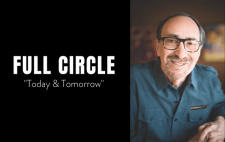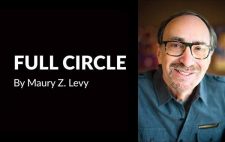The first woman he saw when he came to America was big and green and carried a torch. He had always promised me, my father, that he would take me to see her one day. And, on Father’s Day in 1956, we would make the pilgrimage. Just him and me.
It was a long drive to The City. My father always called it The City. We drove north on the Boulevard, straight up Route 1, through New Brunswick and Edison, Elizabeth and Roselle. At Newark, we rolled down the windows to smell the fumes from the Budweiser plant.
We were really on my father’s home turf now. He had grown up in Newark with guys named Shorty and Pinky and Reds. He went to South Side High, where he played baseball and basketball. His friends called him Whitey because of the shock of blonde hair he had. I never knew my father with hair. He had lost most of it before I was born. And what little hair he had left had long turned gray.
We drove down through the tiled majesty of the Holland Tunnel, the tunnel he had driven through on the day it opened, back in 1927. It always fascinated me, the Holland Tunnel. I never really understood how a tunnel could be built underwater. How did the men breathe? My father told me that it was a very hard job and that many men had died building it. I remember feeling very sad.
And I remember driving through Chinatown, where the only sign in English said, “Lewis Levy, Tailor.” I thought it was very special that my father had his name up in lights, even if it wasn’t my father.
We would park the car and take a crowded ferry to the island. It wasn’t the first time my father had gone there on a crowded boat. We got off and we stood there, just the two of us, and looked at her. She was giant.
“You think you can walk all the way up?” he asked me. “It’s 354 steps, you know.”
How did he know that? When I was 10 years old, my father seemed to know everything.
And so we walked, steel step by steel step, up her dress. Legs aching, we stood at the top of her crown and my father pointed out, out over the Hudson.
“We came from that direction,” he said, “in a very old boat. It was a trip that seemed to last forever until we finally saw her. They blew the boat’s whistle, and 1,000 people rushed to one side of the deck, the deck where we could see her, the great green lady. I remember that I was wearing a shirt and a tie.
“‘You have to look your best,’” your grandfather told me. “‘This is a new country. We want to make a good first impression.’
“Everything we had, the whole family, was packed into one bag, a bag that was held together by two leather belts. As the green lady came into view, I held my sister’s hand tight and started to wave. My father started to smile. My mother started to cry.
“We had come from a ghetto. The four of us lived in two rooms. This wasn’t just a new country to my parents. This was a new start, a new life.
“It bothers me that too many people today take things like that for granted. Things like freedom. Things like liberty. In Poland, people outside our ghetto didn’t like us.
They didn’t want to have anything to do with us. We were Jews. We were second-class citizens. In this country, we were just like everyone else, like the Italians, the Irish, the Germans. If we worked hard, we could get somewhere in life. If we worked really hard, we could get anywhere.”
Then my father looked straight down at me. “That’s what the green lady stands for,” he said. “She stands for liberty and freedom and the chance to make something of yourself. I want you to remember that. Always.”












